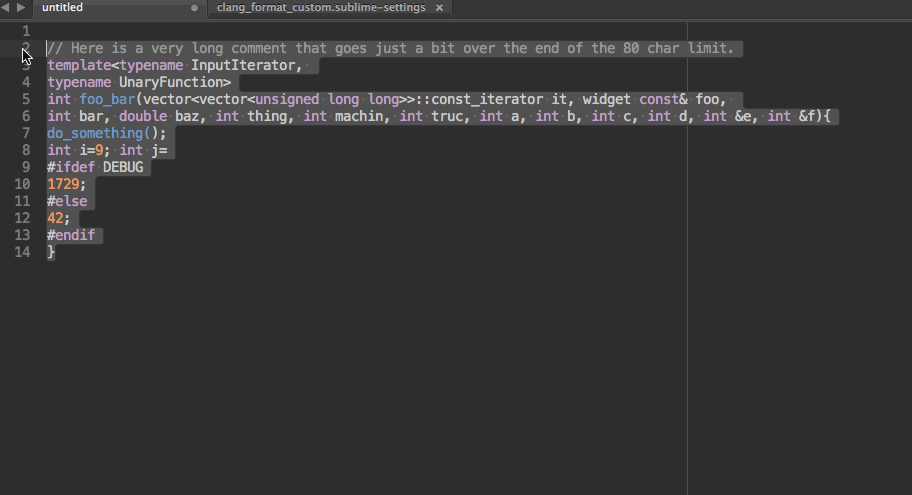This is a modified version of the library, SublimeClangFormat, found here: https://github.com/rosshemsley/SublimeClangFormat
It's modified to format Fabric Engine KL code. There are a few difference, such as the "custom" style must be used, and can be modified, but it has in it some important pieces such as not breaking strings, which doesn't work in KL.
Some other modifications exist to get clang format to ignore access keywords (private, public, protected), ignore the modifiers ? and ! at the end of function names, and not break === and !==.
Clang-format is a tool for formatting C++, built on LLVM. This is a package that allows you to run it easily from within Sublime Text.
In this package, we provide an alternative wrapper around clang-format for use within Sublime Text 3. Whilst LLVM does provide a very simple plugin to work with Sublime Text here, it doesn't really exploit any of the Sublime Text package functionality. We add new features such as customising the style from a settings file, selecting styles using the Command Palette, and easier installation.
- Download the entire LLVM toolchain
and extract the
clang-formatbinary. Just extract the.tar.xzfile and copybin/clang-formatinto your PATH (e.g./usr/local/bin). - Install this package through Package Control in the usual way.
- Set the path to the clang-format binaries. You can do this from within Sublime
Text by choosing
Clang Format - Set Pathfrom the command palette. Hint: the path should look something like this[path/to/clang]/clang/bin/clang-format. If clang-format is in your system path, you shouldn't need to do anything.
- Default shortcut is
super+option+con OSX andctrl+option+cotherwise. This will apply clang-format to the selection. - From the command palette, you can select the formatting type by using
Clang Format: Select Style. You will find the small number of defaults, and also a new 'Custom' entry. Selecting this entry allows you to customise the style through a settings file. You can access it from the main menu, underPackage Settings. In this file you can add custom rules, such asAllmenstyle braces, and different indents. For examples see http://clang.llvm.org/docs/ClangFormatStyleOptions.html. - Settings for the 'Custom' format and others are available through the Sublime Text preferences.
- It is possible to run the formatter on every save to a file, change settings
to
"format_on_save": true. - To change settings on a per-package basis, add them under
ClangFormatkey, example project.sublime-settings:
{
"folders": [],
"settings": {
"ClangFormat": {
"format_on_save": true
}
}
}-
... And want to contribute, PR's gladly accepted!
-
Maybe you'll like my other plugin, iOpener. It lets you open files by path, with completion, history, and other goodies.
-
Otherwise, why not pop on over and star this repo on GitHub?
Thanks to the LLVM project for doing the hard work, including writing clang format, and also the original Sublime Text plugin on which this package is based.
Also thanks to y0ssar1an, Bendtherules and other contributors for their improvements!
Why not go and watch the video that got me interested in clang-format in the first place?
